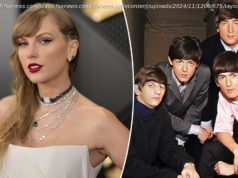The singer gets campier and more creative on her fourth album.
Update your glossary: “Pop music” no longer means “music that’s popular.” Clubby thump, breathy wails, mathematically engineered hooks, rhyming fire and desire and higher—the bundle may be going the way of big band or nu metal, from central to niche. The latest sign of the shift is that Taylor Swift’s animatronic new single failed to dethrone a country-rap novelty from No. 1. Before that, The New York Timesreported the end of “a one-size-fits-all” solution for hits, and Pitchforkkicked off a pan with, “Pop is dead; here is its corpse; here is Diplo attempting to make the corpse dance.”
For all her great charms, Carly Rae Jepsen has long seemed like the melodious canary in modern music’s coal mine. When the Canadian Idol runner-up landed “Call Me Maybe” as 2012’s breakout smash, it was a classic tale of sweet bubblegum conquering all. Yet even though her albums, 2012’s Kiss and 2015’s Emotion, were as clever and winsome as that hit—though maybe a half-degree less catchy overall—they were not the juggernauts that other eras might have made them. Instead, they became something that seems the opposite of pop: cult favorites. Girlish, lovelorn singalongs of the sort often unfairly dissed as “generic” had suddenly found themselves with a highly specific constituency bridging the indie-rock club and the gay video bar.
If music like Jepsen’s has been losing its ubiquity, it’d stand to reason that it’s because the formula has exhausted all its possible permutations. How many times can “Thriller” and “Like a Virgin” and “Just Dance” get rewritten? Sure enough, the first singles for Jepsen’s latest album, Dedicated, did give the impression of someone stuck in a pleasant cul-de-sac. The synthetic sparkles and volcanic choruses of “Now That I Found You” and “Party for One” work as spectacular calisthenic fodder, but they don’t pack much surprise.






